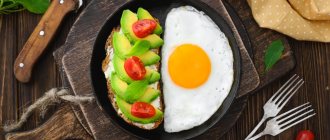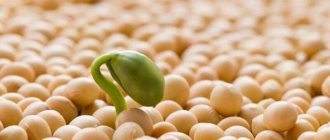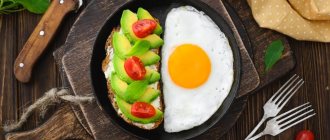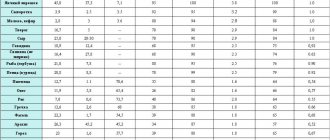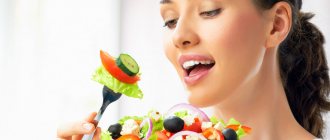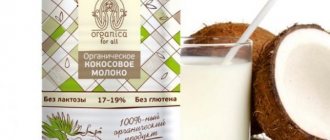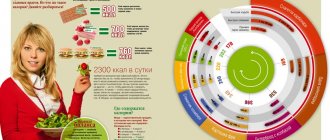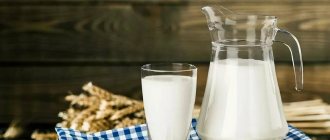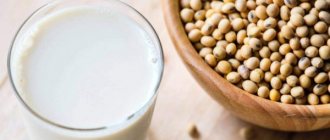We can say that vegetarian nutrition is built on the basis of several interrelated principles: refusal to eat meat, a diet consisting mostly of plant-based products, condemnation of the killing of animals, and the desire to consume healthy and nutritious foods that bring the greatest benefit to the body.
And a kind of central place in the coordinate system defined by these ideas belongs to lacto-ovo vegetarianism. Which, on the one hand, does not require killing animals for food, and provides a large selection of products to create a diet that allows you to cover all the body’s needs, including vitamins and microelements, on the other. “Lacto” means milk, “ovo” means eggs, and all together - a vegetarian-type food system, which, in addition to plant foods, includes eggs and dairy products, respectively.
What do lacto ovo vegetarians eat?
Here is a slightly more detailed list of what is included in the menu that offers lacto ovo vegetarianism to its followers. Part of this list is typical for almost all types of vegetarianism; there is also something on this menu that is not suitable for all vegetarians. So, what is not given up in stricter forms of vegetarianism (veganism, for example) is:
- fruits, in any form, including juices and dried fruits;
- vegetables, various vegetable dishes;
- legumes, grain products, various cereals and cereals;
- nuts and seeds.
Let us note here that lacto-ovo vegetarianism does not imply any restrictions on methods of preparing “allowed” products . They can be boiled, fried, baked, salted, preserved in other ways and, of course, eaten raw. Further:
- honey, vegetable oils, mushrooms; Lacto-ovo vegetarianism does not in any way regulate, prohibit, or “prescribe” these products for consumption, like the following two types of products;
- dairy products - milk, butter, cottage cheese, cheeses, yogurt, sour cream, fermented milk products;
- eggs, 1-2 eggs per day is considered the norm in this food system.
Product Lists
Check in advance for a list of foods that you can eat while following a lacto-ovo vegetarian diet and which are strictly prohibited. From the first list, at your discretion, you can always exclude something (for example, you do not eat yogurt or cannot tolerate other dairy products).
But including a number of other products is strictly prohibited without the help of specialists.
Authorized Products
Dairy products:
- acidophilus - milk fermented with a special bacterium;
- ghee - category of ghee;
- infant formula;
- yogurt;
- kaymak - thick cream;
- kefir;
- kinuski - an analogue of boiled condensed milk;
- kumis - a drink made from mare's milk;
- kurunga - Asian sourdough;
- colostrum;
- milk and milk whey;
- ice cream;
- buttermilk - low-fat cream;
- yogurt;
- ricotta - whey cheese;
- fermented baked milk;
- condensed milk;
- skyr – filtered yogurt;
- cream;
- oil;
- sour cream;
- snowball;
- frothed milk;
- cottage cheese;
- curd;
- curd cheese;
- melted butter;
- chkhurpi - dried smoked cheese prepared at home;
- Shubat is a drink made from camel milk.
Eggs, from which you can prepare a huge number of dishes:
- Benedict - a sandwich with bread and poached egg;
- in a bag;
- hard-boiled egg;
- soft-boiled;
- mandirmak - overcooked vegetables with the addition of a layer of beaten eggs cooked in a frying pan;
- Mish-Mash - Bulgarian scrambled eggs;
- omelette;
- Parmentier;
- poached egg - cooked in hot water with vinegar, without shell;
- scrambled eggs;
- frittata - a combination of omelet and casserole;
- shakshuka - scrambled eggs with tomatoes, sweet peppers, onions and spices;
- Scottish.
List of herbal products:
- legumes;
- mushrooms;
- cereals;
- porridge;
- pasta and other types of pasta;
- vegetable oils;
- seafood;
- vegetables;
- nuts
- sweets;
- soya beans;
- spices;
- fruits;
- dried fruits;
- baked goods with added grains.
Prohibited Products
If you follow a vegetarian diet, you are prohibited from:
- any meat;
- fish;
- seafood (including caviar);
- cheese (uses rennet, which is boiled from veal stomachs).
An ovo-vegetarian excludes all milk from the list of permitted foods, focusing on egg dishes. On the contrary, a lacto-vegetarian is the opposite.
What is allowed to eat and what is not for different categories of vegetarians: lacto, ovo, vegans. About this in our article: “Instructions for lovers of plant foods.”
Lacto-ovo vegetarianism in the debate about the dangers and benefits of vegetarianism
The main argument put forward by supporters of meat-eating is that only meat contains the entire necessary complex of proteins, fats, carbohydrates, vitamins and microelements necessary for the growth and normal functioning of the body; Vegetarians don't get enough of it. First of all, we are talking about vitamins D and B12, some amino acids, as well as calcium. In this regard, lacto ovo vegetarians have an easier time than stricter vegetarians. Eggs are a recognized “supplier” of easily digestible, complete protein, including the entire complete set of essential amino acids . Eggs also contain a lot of vitamins, including the notorious B12.
But we must remember that they, as well as the calcium contained in eggs, are less absorbed than when eating, for example, plant foods. But dairy products help saturate the body with calcium, vitamins D, B12, and again, amino acids. And to ensure a normal level of iron in the body, there are, for example, dried fruits. That is, lacto ovo vegetarians do not suffer from nutritional deficiencies. But a deficiency of animal protein can lead to the consumption of sweets and flour products; you need to carefully monitor the balance of your diet.
What type of vegetarianism is best?
Vegan vegetarians
The best type of vegetarianism is undoubtedly the most strict one with the use of biological additives, tablets that are designed to eliminate the deficiency of vitamin B12, D, omega 3 fatty acids and other components that are found in meat or promote better absorption of vitamins and microelements from food, including gland.
Vegans
Vegans are the strictest vegetarians who do not allow the consumption of any animal products, excluding cheese or even honey from the diet, vegans are often also called raw foodists, such people exclude any thermal and factory processing of products, so factory-made nuts or legumes are always thermally treated at temperatures of 70 degrees for the sake of good preservation of goods on the shelves of warehouses and stores for a long period, in any case, this increases the carcinogenic properties of the products, but reduces the risk of mold and spoilage.
Pescetarianism
Next we have pescetarianism, which allows the consumption of fish, in this case all problems with a lack of vitamins and microelements are solved, sufficient consumption of omega 3 guarantees additional protection against cardiovascular diseases, or rather, the consumption of fish meat does not lead to such sad consequences as the consumption of warm-blooded meat with from the point of view, again, of the effect on the heart, but fish is a source of mercury and other undesirable components entering our body, since the seas and oceans are already quite polluted today, the fish itself absorbs these substances, and the larger the fish in size, the more dangerous it is. In any case, it is recommended to eat fish caught in the northern seas and oceans; river fish is definitely of little use.
Latovegetarisvo
Next on our list is latovegetarisvo, here there is little salvation from heart disease and stroke, but the opportunity to get cancer at an early age. This is especially true in the United States, where heart and vascular diseases are rampant.
Ovo-vegetarianism
Ovo-vegetarianism involves eating only eggs from animal products, but this is a direct blow to our cardiovascular system.
Semi-vegetarians
Semi-vegetarians are vegetarians who eat meat as a medicine for their body, to prevent deficiency of vitamin B12 and omega 3, as a rule, they are pescatarians who occasionally eat fish and have the same level of life expectancy as strict vegetarians.
Young vegetarians
Young vegetarians are vegetarians who eat dairy products and sometimes eggs, and can be compared to lacto-vegetarians and ovol-lacto-vegetarians. Young vegetarians place much more emphasis on dairy products and eggs than on raw vegetables and fruits like lacto-vegetarians and ovol-lacto-vegetarians, which, in our conclusion, exposes themselves to the maximum risk of premature death.
Back to section
Benefits and variety of dairy products
Along with nutritional value, dairy products have a number of beneficial properties. It’s not without reason that milk is given to workers in “harmful” industries – it helps neutralize toxic substances and radiation. When excluding meat from the diet, it will be necessary to pay attention to a sufficient amount of fat in the diet. Their supply can be provided by products with a high content of milk fats: butter, sour cream, cottage cheese with a high percentage of fat content; along with vegetable oils and other fat-containing plant products, such as avocados. Fermented milk products, primarily kefir, as well as yoghurts containing special cultures, have a beneficial effect on the intestinal microflora. And the list goes on.
But those whose diet has not included milk for a long time need to make sure that they are not allergic to milk protein and that the body digests milk protein well in all forms. To be fair, let us mention that some consider milk in general to be almost a poison, a product that is certainly harmful to the body. But the millennia of existence of, for example, the Vedic culture, in which lacto vegetarianism has an equally ancient history, shows the excessive severity of this opinion.
Who are vegetarians
The reasons why a person turns to vegetarianism are ethical or religious. Vegetarians are people who completely abstain from consuming animal products. They promote healthy plant-based eating.
The doctrine is based on the following principles:
- There are thousands of plants in nature that are edible. Most people get their nutrients from animal foods, so they don't need this variety. Vegetarians use the gifts of nature to their maximum benefit.
- The body must receive the “right” fats; they are found in large quantities in nuts, olives, and avocados. The diet of vegetarians is balanced and contains all the necessary substances. Despite the high calorie content of foods, a person does not gain weight; when combined with vegetables, food quickly fills you up.
- Fresh food is used for food. Proponents of the doctrine minimize thermal processing of food and do not store ready-made meals in the refrigerator. Many adhere to a raw food diet and eat raw foods.
- Plant foods are rich in fiber, it cleanses the body of harmful substances, rejuvenates, and increases energy. The first days of giving up animal foods in favor of plant foods bring results, a person becomes calm and feels a surge of strength.
- An important principle of vegetarianism is the use of fresh and ripe fruits for food. Unripe and stale foods cause harm on a physical and energetic level. Stale food is useless and dangerous to the body. As a result, a person’s instincts become sharper, and he intuitively searches for good food.
- Vegetarian food is rich in vitamins and minerals and is completely processed. Plant foods do not cause putrefactive processes in the intestines, so gastrointestinal diseases are minimized.
- Drink plenty of fluids. Most adherents of vegetarianism refuse tea and coffee, preferring clean water. Its use is mandatory, despite the large number of vegetables and fruits in the diet that contain water.
- Fruits occupy a special place; their consumption is considered a separate meal. The use of fruits as desserts is not recommended. Smoothies are popular because they start digestive processes in the body in the morning and fill it with energy throughout the day.
- Food should be warm. Vegetarians try not to eat hot or cold food. Even in winter, when vegetables are stored in the refrigerator, prepared salads must sit to reach room temperature.
- The main principle of the teaching is always a good mood!
Vegetarianism as a weight loss system receives flattering reviews. It should be remembered that animal food must be replaced with plant food containing similar beneficial substances.
Those who want to lose weight should not get carried away with confectionery products that are allowed for consumption. Maintaining the basic principles that form the basis of vegetarianism will allow you to get a decent result.
Non-vegetarian dairy products
It may seem strange, but not all dairy products are suitable for a vegetarian table, and this applies not only to recipes like “boil meat in milk...”. In the production of most cheeses and some types of cottage cheese, rennet (renin) is used, usually obtained from the stomachs of young calves. But rennet of microbial or microbacterial origin is also used. Ideally, this should be indicated on the packaging.
Gelatin is also mostly of animal origin; to obtain it, animal bones, tendons and cartilage are boiled. Gelatin is often used in making ice cream and other dairy desserts, as well as some types of sour cream and yogurt. But there are also gelatins of plant origin - pectin, agar-agar and others. (By the way, carob fruits are considered the best gelling agent for confectionery products). In general, lacto vegetarianism in modern conditions requires careful study of what is written on the packaging of dairy products.
Disadvantages of a vegetarian diet
- Meat contains essential amino acids, the refusal of which can lead to vision impairment (but this is only a small percentage of vegans).
- Vegetable protein is less easily absorbed in the human body. For example, buckwheat porridge is digestible by sixty-five percent, millet by seventy, potatoes by sixty-seven. But meat, fish and poultry - from eighty-nine to ninety-eight.
- With long-term and strict vegetarianism, immunity decreases after six to seven years.
- Avoidance of animal proteins is contraindicated for children because it inhibits the child’s growth.
- If you don’t calculate your budget correctly, you can spend more on this diet than on meat-eating.
Thus, whether to become a vegetarian or not is a personal matter for everyone. In fact, there is absolutely nothing critically bad for our body in vegetarianism. It can most likely be considered simply a decisive life position. But, before making any final decision, you need to weigh all its pros and cons very well (evaluate all the benefits and harms of vegetarianism). After all, no one can take care of your health better than you. Always remember this and make the right choice.
Medical indications for lacto-ovo vegetarianism
One of the important reasons for switching to a vegetarian diet is the belief in the beneficial effects of the latter on health. And in the case of lacto-ovo vegetarianism, this can be considered the most proven. There are a number of medical indications for the use of appropriate diets. So a lacto vegetarian diet helps reduce blood cholesterol . Moreover, eggs, contrary to popular belief, do not contain active cholesterol and are not harmful to humans. (About 80% of “bad” cholesterol is produced by the body itself as a consequence of an unhealthy lifestyle).
Numerous studies show that the risk of cardiovascular diseases (atherosclerosis, coronary heart disease, hypertension, etc.), diseases of the digestive system, and malignant tumors in vegetarians is much lower than in those who eat meat as a significant part of their diet.
In conclusion, we add that despite the fact that we paid more attention to dairy products and eggs, the basis of the diet of lacto ovo vegetarians is still plant products: vegetables, grains, fruits, and so on on the list. The consumption of milk and eggs becomes a supplement that provides nutritional balance and helps to adapt a vegetarian diet to various situations, such as weakening of the body due to illness or seasonal nutritional needs. But, in turn, it requires careful monitoring of product compatibility.
How to become a vegetarian?
You need to prepare for the transition to a vegetarian diet; the body needs time to adapt not just to a new diet, but essentially to a new way of life. Where to start?
Medical examination
Before radically changing your diet, it is recommended to consult a doctor and undergo a short examination, which necessarily includes a biochemical blood test and diagnostics of the state of the digestive system. If anemia is detected, a decrease in protein levels in the blood and other deviations from the norm, it is necessary to undergo treatment, otherwise switching to vegetarianism may worsen the problem.
You should not dramatically change your diet during acute illnesses, as well as during the period of recovery of the body after serious illnesses, operations, during pregnancy and breastfeeding.
Gradual transition to plant foods
It is recommended to switch to plant foods gradually, reducing the amount of meat in the diet and increasing the percentage of plant foods. If you are not ready to give up meat right away, you can gradually remove it from your diet. First you need to stop eating red meat and offal (beef, pork, lamb, etc.), then eliminate poultry, then fish and seafood.
After completely abstaining from animal foods, beginning vegetarians are advised to continue consuming dairy products or eggs. If desired, you can move on to a more strict form of vegetarianism in the future.
The digestive system needs time to adapt to a new diet; this process usually takes from a week to several months in healthy people. With an increase in the amount of plant foods in the diet, the intake of fiber in the body increases, so digestive disorders may occur. During this period, additional intake of probiotics is recommended.
Diet preparation
A nutritionist will help you balance your diet.
You should be very responsible when planning your diet. It should include daily foods that provide the body with the necessary nutrients as fully as possible. At first, you may have to eat more often, since plant foods are digested faster than “heavy” meat foods, and the feeling of hunger will appear faster.
The diet should be very varied. Of course, vegetables and fruits contain many vitamins and minerals, but they are relatively low in protein, and they also lack some essential amino acids for humans. The main source of protein should be legumes (soybeans, beans, peas, lentils, chickpeas, etc.); nuts, cabbage (broccoli, cauliflower), asparagus, cereals (oatmeal, buckwheat), bananas, and avocados are high in protein. It is these products that should be replaced with meat and fish, and in no case with pasta, potatoes and other carbohydrate foods.
In addition to protein, attention should be paid to products containing iron, zinc and iodine, which plant foods are also not rich in. Sea kale, citrus fruits, greens, bran and grains, seeds, and sprouted wheat will help solve this problem.
Unrefined vegetable oils (linseed, rapeseed, soybean, etc.), which contain unsaturated fatty acids and vitamins, are a source of valuable substances for vegetarians.
One of the main problems of vegetarians is providing the body with vitamins B12 and D, as well as calcium. When eating dairy products and eggs, a person will receive sufficient amounts of these substances. The body can partially obtain these vitamins from leafy vegetables, cabbage (Chinese and broccoli), nuts and seeds, tofu; their source is also yeast, which is not the least important in the diet of vegetarians. And if you completely refuse products obtained from animals, you need to take vitamin supplements or consume products of plant origin, additionally enriched with vitamins and minerals.
Lactovegetarianism - advantages
The advantage of a gentle vegetarian diet is the gradual transition to a new diet. Most of the dishes you eat will remain on your menu, albeit in a transformed form:
- cheese;
- cottage cheese;
- sour cream;
- baked or condensed milk;
- regular ice cream;
- cream.
You can use all these products in the menu every day, but the base will remain vegetable and cereal.
But what about the hundreds of publications about the dangers of milk, you ask? Have doctors and nutritionists really changed their minds and no longer scare us that milk is poison? details here...
Example menu
Here's a five-day sample menu you can use to start your lacto-vegetarian diet.
Monday
- Breakfast : Oatmeal with cinnamon and sliced banana
- Lunch : vegetarian sandwich with sweet potato wedges and side salad
- Dinner : Bell peppers stuffed with quinoa, beans and mixed vegetables
Tuesday
- Breakfast : yogurt with walnuts and mixed berries
- Lunch : Lentils with brown rice, ginger, garlic and tomatoes
- Dinner : Stir-fry with peppers, green beans, carrots and sesame ginger tofu
Wednesday
- Breakfast : Whey protein shake, vegetables, fruits and nut butter
- Lunch : Chickpea pie with roasted carrots
- Dinner : Teriyaki tempeh with broccoli and couscous
Thursday
- Breakfast : Overnight soaked oats with chia seeds, milk and fresh fruit
- Lunch : Burrito with black beans, rice, cheese, guacamole, salsa and vegetables
- Dinner : vegetarian chili with sour cream and side dish
Friday
- Breakfast : toast with avocado, tomatoes and feta cheese
- Lunch : Lentil baked ziti with roasted asparagus
- Dinner : falafel with tahini, tomatoes, parsley, onion and salad
Lacto-vegetarian snacks
Here are some healthy snacks you can include in your lacto-vegetarian diet:
- carrots and hummus
- sliced apples with nut butter
- kale chips
- cheese and crackers
- mixed fruits with cottage cheese
- fried edamame
- yogurt with berries
- agil with dark chocolate, nuts and dried fruits
Summary:
The five-day sample menu above provides some ideas for meals and snacks you can enjoy as part of a lacto-vegetarian diet. You can adjust it as you wish according to your personal tastes and preferences.
Vegetable sausages, sausages and cutlets
If you simply cannot live without sausage or sausages, then products of completely plant origin are at your service: wheat sausages and wheat sausages. They are sold in Indian grocery stores and cost about the same as their animal counterparts, but they are no different in taste, color and texture (they are also sometimes delivered to large supermarkets, but they cost much more there).
They produce wheat “doctor” and “smoked” sausages. There is also an assortment of vegetarian cutlets made from soy asparagus - usually in the form of dry mixtures, they need to be filled with hot water and crushed, rolled into balls or pucks, and then fried.
Another interesting analogue is vegetarian soy asparagus marinated in curry sauce, perfect for complementing boiled potatoes, pasta or rice. Some supermarkets sell vegetable cutlets - potato, beet, carrot, cabbage, but their texture is still somewhat different, better try potato zrazy with mushrooms - they are perfect as a replacement for traditional cutlets for pasta.
Recipes for a lacto-vegetarian menu for every day
And during the transition process, you will be able to exchange the meat itself for taste and texture sensations with soy asparagus - a product of soybean processing, which, with the necessary drying and processing, becomes fibrous and heterogeneous. It can be fried, boiled, marinated in Indian curry sauce (a very spicy bouquet of various flavors) and cooked in addition to cereals.
Just throw a small amount of soy asparagus into boiling water along with the cereal and make sure it is cooked on all sides; There is even an opinion that soy asparagus can even speed up the cooking of rice and buckwheat a little.
Asparagus - yes, it's meat!
An everyday delicious dish for a lacto-vegetarian can come in a variety of versions: boiled rice with cheese and boiled soy asparagus, with ground red pepper - add the pepper and cheese just before serving; buckwheat with tomato sauce, parsley and boiled soy asparagus and mushrooms - fry the mushrooms separately, finely chop the parsley before serving.
Boiled pasta with grated cheese, mayonnaise sauce, curry sauce and sweet corn - the grated cheese is placed immediately after the boiling water is drained, the curry is sprinkled on it while stirring, the mayonnaise sauce and corn are added at the very end, before eating.
Hercules in milk with honey, condensed milk or jam - once the oatmeal is cooked, leave it in the pan for three or four minutes, it will absorb the remaining liquid and become a dense second, into which sweet seasonings are added on a plate, you can add a slice or two of tangerine - the taste is unforgettable.
Fried potatoes with fried boiled soy asparagus with mushrooms, parsley and delicate sour cream - try sprinkling the potatoes with ground ginger, it will turn out to be a very warming second dish.
Cabbage
Boiled broccoli or cauliflower with boiled potatoes, dill, garlic and mayonnaise sauce - take out the cabbage before the potatoes, otherwise it will boil. Each dish takes about half an hour to prepare, resulting in an extremely nutritious mix of a wide variety of plant foods.
As a substitute for mayonnaise, which contains eggs, use lean mayonnaise sauces of the mid-price category - their taste and texture are as close as possible to real mayonnaise.
And for a chocolate dessert, choose chocolate with a high percentage of cocoa; it will become a more healthy vitamin-rich snack. And most importantly, during the cooking process you can experiment, adding pepper or herbs to your plate to find the perfect combination exactly for your taste.
Vegetarianism destroys the body
Regarding vegetarianism (all of the following applies equally to a raw food diet), I would like to immediately make two important statements.
Firstly, vegetarianism (refusal to consume animal proteins) is an illusion, and a person will continue to consume animal proteins in any case, and secondly, vegetarianism is not at all as harmless as it seems.
First I want to show that vegetarianism is an illusion.
Let's think about what, by and large, is the difference between a vegetarian and a meat eater? Only because he does not eat meat and, therefore, does not receive from meat some essential amino acids that are not found in plant foods.
But how does he live if he doesn’t receive these amino acids?
It turned out that a vegetarian gradually adapts to a vegetarian diet; saprophytic bacteria appear in the intestines, which process the fiber that comes with food and provide the body with the same animal essential amino acids.
Those. If a meat eater depends on the intake of meat along with food, then a vegetarian depends on the state of his own microflora in the intestines. What's the downside to this? The first obvious disadvantage of vegetarianism is that the intestinal microflora is killed by various foods and drugs: garlic, onions, antibiotics, sulfonamides and other drugs. Therefore, a vegetarian will have to give up these foods and medications.
In addition, back in the middle of the twentieth century, our physiologists (I.P. Razenkov, 1948) discovered the fact that a person eats himself. It turned out that in the human stomach and intestines not only food received from the outside is processed, but also proteins secreted into the digestive tract from the internal environment of the body.
Moreover, surprisingly, there were a lot of such internal proteins secreted into the stomach and intestines. Scientists made a comparative calculation of protein consumption per day and found that the ratio of eaten and endogenous (internal) proteins is approximately the same - 1:1 (G.K. Shlygin, 1997). This means that a person who eats 100 grams of protein per day will actually get another 100 grams of their animal protein (from themselves). In total, you get 200 grams of protein per day.
Those. If a vegetarian completely stops consuming animal protein, then all the same, he will receive a “piece of meat” in the form of 100 grams of his own endogenous animal proteins. This is provided by nature just for such cases. Those. Mother Nature insures her unreasonable child - man and does not allow a sharp shortage of essential amino acids. If a person stops eating meat altogether, then he still continues to eat himself, his meat.
So, as we see, vegetarianism is an illusion. Both vegetarians and meat eaters eat ANIMAL proteins. Meat eaters take them with food, vegetarians take them from saprophytic bacteria living in their own intestines, and from themselves.
Now I would like to say a few words about the dangers of vegetarianism.
The fact is that it is not even vegetarianism in itself that is dangerous, but a sharp reduction in caloric intake for a long time.
Of course, reducing calorie intake for an overweight person is very good. For a person suffering from non-insulin-dependent diabetes mellitus (type II diabetes), this is simply a salvation from his illness.
But everything has its limit. If you have lost enough weight and have a normal weight for your height, then you need to switch to a normal diet of the recommended 2000-2500 kcal and give up vegetarian food.
Otherwise, the consequences can be very sad. Moreover, I’ll emphasize this again, this applies not only to a vegetarian diet, but also to any other low-calorie diet, even if it includes meat (Montagnac, Protasov, etc.). What are the dangers of low-calorie diets?
The fact is that a vegetarian is no different morphologically (i.e. structurally) from an ordinary person. Consequently, he spends approximately the same 1400-1600 kcal on basic metabolism (maintaining body temperature, moving blood through the vessels, working the respiratory muscles, working the heart, intestinal motility, etc.) as an ordinary person.
But an ordinary person eats 2500 kcal per day, and a vegetarian only 1000 kcal, and can live like this for years. Where do these missing 400-600 kcal per day, so necessary for a vegetarian, come from? Maybe we are faced with a violation of the law of conservation of energy here? Of course not. The fact is that the human body has an energy source that allows you to use the energy received once many times. This source of energy is muscles, or rather lactic acid, which is released when muscles work.
Let's look into this issue.
So, let's assume that a vegetarian eats 1000 kcal per day. Of these, approximately 800 kcal are carbohydrates. Carbohydrates entering the human body are converted into glucose and enter the blood. Glucose is stored in the liver and skeletal muscles in the form of glycogen in a ratio of 1:3. In total, out of 800 kcal of glucose entering the blood, 267 kcal of glycogen enters the liver, and 533 kcal of glycogen enters the skeletal muscles.
If everything is clear about liver glycogen - it is released into the blood and consumed as needed, then the consumption of glycogen by muscles is a very interesting and important question. The fact is that skeletal muscles do not use their glycogen completely in an oxygen-free mode, but only 5% of their energy reserves! The remaining 95% is excreted into the blood in the form of lactic acid (lactate). This lactic acid (lactate) enters the liver, is converted into glucose and can be reused.
So, in the human body, 95% of stored muscle energy can be reused. For a vegetarian who has 533 kcal of glycogen in his muscles, these reserves of lactic acid, which can be used again, amount to 506 kcal per day.
In total, we see that with a diet of 1000 kcal and active movement, releasing energy from the muscles in the form of lactic acid, a vegetarian enters the bloodstream in the amount of 1000 506 = 1506 kcal per day. And if you train 2-3 times a day, then more.
Outwardly, everything seems wonderful, but what is the danger here?
Now we will understand this too.
Let's go back to the average person eating 2500 kcal per day. Its reserves of lactic acid are 1020 kcal per day. If these 1020 kcal also entered the blood and returned again to the skeletal muscles, then such a person would inevitably gain weight, because 2500 1020 = 3520 kcal of energy enters his blood per day.
But this doesn't happen. Where does lactic acid (lactate) go in the body of an ordinary person? Where does an ordinary person spend this reserve that allows a vegetarian to survive?
It turned out that in the body of a normal person (not a vegetarian), almost all the energy of lactic acid (lactate) is given to the brain! Here's what American researchers P. Hochachka and J. Somero write about this in the book \"Biochemical adaptation\" (1988): \"... If the concentration of lactate in the blood is increased, then it can be used in skeletal muscles, lungs, heart and in brain tissue as a source of carbon and energy, often preferably to glucose." \"In the liver and kidneys, lactate is mainly used in the process of gluconeogenesis; in most other tissues and organs, including the brain, heart and lungs, lactate serves as an excellent substrate for oxidative metabolism and is often utilized even before glucose, which contributes to the rapid restoration of metabolic homeostasis."
Why is lactic acid (lactate) more beneficial for tissue nutrition than glucose? We read the answer from the same authors: “Experiments show that the rate of absorption and oxidation of lactic acid is 2-10 times higher compared to glucose.” In the same work, American biochemists, based on the results of experiments on adaptation to diving, conclude that the brain of an ordinary person consumes 90% of the energy of glucose and lactate contained in the blood.
So, in an ordinary person (not a vegetarian), as soon as lactic acid appears in the blood, almost all of it (more precisely 90%) is immediately used as a source of nutrition for the brain. A vegetarian does not have the same opportunity to use lactic acid. In a vegetarian, all lactic acid, after being processed in the liver into glucose, is returned to the skeletal muscles. The brain stops receiving its usual nutrition. Oxygen, which in an ordinary person oxidizes lactic acid in the brain, becomes unnecessary. This leads to two important conclusions that can easily be verified by looking at vegetarians. The first important consequence: since there is no need to nourish the brain, the body’s need for the universal oxidizing agent—oxygen—is sharply reduced. As a result, the vegetarian’s breathing rhythm slows down and reaches 4-5 respiratory movements per minute. Over time, the vegetarian’s breathing is completely restructured in such a way that the brain’s use of lactic acid energy becomes impossible (you can read more about what this can lead to in the book by M.Ya. Zholondza \"Vegetarianism: mysteries and lessons, benefits and harm\" ", - St. Petersburg, \"All\", 1999). So, slowing breathing is the first and very important sign that it is time to return to a normal diet, it is a sign that it is time to end the low-calorie diet, the brain has already stopped receiving its usual nutrition and has begun to slow down its work! Regarding the number of breaths per minute, I already wrote earlier: if a person eats normally, then his norm is 16-17 breaths per minute. If a person is on a low-calorie diet, then a decrease in the number of respirations per minute means that all fat reserves have already been exhausted and the body is forced to begin taking food away from the brain just in order to survive. Energy for the muscles, for survival, becomes more important than energy for the brain, more important than the thinking process.
The second important consequence: since the only additional source of energy is in the muscles, a vegetarian must force himself to move a lot, only in this case it is possible to replenish the body’s energy in the form of lactic acid. And look for yourself - all vegetarians are always on the move - Galina Shatalova runs through deserts, Paul Bragg climbs mountains, Leo Tolstoy plows on a horse, Porfiry Ivanov runs 70-140 km a day. A vegetarian cannot live without movement! While spending only 5% of muscle glycogen during movement, he receives 95% of his energy in the form of lactic acid. By the way, this is exactly why morning exercises are useful - glycogen reserves in the liver have been depleted overnight, in order to recharge the body with energy, you need to work your muscles a little, then the released lactic acid (lactate) will replenish energy reserves.
But let's think, what will happen if a vegetarian does not move, does not play sports, but leads a sedentary lifestyle?
The fact is that the body has provided for this. Such a person will be prone to outbursts of rage and anger, which (ATTENTION!) are accompanied by reflexive tension in all the muscles of the body! Those. In any case, nature will take its toll and will not allow the body to die from exhaustion. It will act according to the principle of the commanders of the Red Army: “If you can’t, we’ll help.” If you don't know how, we'll teach you. If you don’t want to, we’ll force you.” Nature, one way or another, will force a person on a vegetarian low-calorie diet to strain his muscles. If he does not do this himself through physical exertion, then he will do it in a fit of hysteria or other mentally abnormal excitement.
This is confirmed by observations of famous vegetarians. Vegetarian Isaac Newton, according to contemporaries, was an extremely arrogant and greedy person. An unsatisfied thirst for action pushed him into all sorts of dubious adventures, and, in the end, he became a stock speculator. But the search for thrills ultimately led to his collapse. Newton invested his entire fortune in shares of the South Sea Bubble Company, which promised its investors fabulous profits from the development of metal deposits in Mexico and Peru, and from the slave trade. Having earned huge sums of money from speculation in these stocks, Newton did not slow down his incredible greed in time and went bankrupt in 1720, when the soap bubble
The South Sea Company has collapsed. This was one of the first major stock market speculations in history.
Vegetarian L.N. Tolstoy, during periods when he could not engage in hard peasant labor (autumn-winter period), committed many actions that both interfered with his life and disturbed the whole country. In addition, Tolstoy was known for his stormy family scandals with his wife and children, because of which, in fact, he left his home in October 1910 and soon died.
Vegetarian Adolf Hitler amazed his compatriots with public hysteria, the proportions of which were so great that they managed to infect the whole of Germany. There is probably no need to remind about the depth of his hatred of the Slavs and Jews. On his orders, they were destroyed by the millions.
So, long-term vegetarianism in the absence of constant movement is the shortest path to scandals, squabbles, mental illness and suicide.
All of the above applies to any low-calorie diet (less than 1000-1200 kcal per day), even if it includes meat. I note that for an overweight person, low-calorie nutrition is an inevitable part of the weight loss process. But as soon as the weight has reached normal, you need to gradually increase the calorie intake to normal - 1800-2500 kcal per day. By the way, it must be said that if a vegetarian eats a lot and eats a normal amount of calories per day (1800-2500 kcal), then all of the above does not apply to him.
Those. The first harm of vegetarianism lies precisely in its low calorie content.
But vegetarianism also has a second harm - it is dangerous not only because it is low in calories, but also because it causes hormonal imbalances. According to research by American scientists (E. Vliet, 2001), a strict vegetarian diet disrupts the balance of thyroid hormones T3 and T4. Studies were carried out in different countries, but they all showed that in people who refused to consume animal proteins, the functioning of the endocrine system was disrupted when converting T4 to T3 in the thyroid gland, and in women, the production of estradiol and progesterone by the ovaries was also disrupted. All this led to the fact that vegetarian women experienced more frequent menstrual irregularities and showed signs of hypothyroidism (thyroid dysfunction), and therefore a slower metabolism, lethargy, dry skin, swelling, constipation, low heart rate, poor cold tolerance (\"I can't get warm\"), etc. All these signs and disorders disappeared when animal proteins were included in the diet.
Therefore, I want to warn ideological vegetarians - if you want to eat mainly plant foods, then be sure to include dairy and fermented milk products and eggs in your diet. This will be quite enough to satisfy the body’s need for animal protein, and in this case vegetarianism (or rather, it will already be called lacto-vegetarianism) will not bring harm. Think about the fact that the ideal food for a baby - human milk - contains animal proteins, and not plant proteins at all. And if nature simply obliges a baby to eat animal proteins, then doesn’t this mean that animal proteins should not be feared or avoided? Concluding this conversation about vegetarianism, I want to touch on one issue - the issue of eating soy products.
Now soybeans are added to many meat dishes, minced meat, and sausages. If earlier there was a joke: “Buy three pasties at the market and assemble a cat from them,” now it is quite possible to remake it: “Buy three pasties at the market and assemble a jar of soybeans from them.” Soy added to minced meat, even if its share is 30% of the mass of minced meat, does not change its color or taste at all, but makes the cost of minced meat 30% cheaper. Many zealous housewives offer soy cutlets to their husbands and children, believing that in this way they are taking care of the health of their family.
This is mistake. Soy is unhealthy.
Soy has a very bad effect on the thyroid gland (slows down its work), and the ancient Chinese knew about this. They noticed that eating soybeans leads to slow thinking, loss of energy, slow heart rate, dry skin, constipation, etc. The ancient Chinese acted very wisely - they declared soybeans a sacred crop and banned their consumption. In ancient China, soybeans were used only in agriculture, thrown into the ground to replenish nitrogen in the soil.
It is now known that soy contains isoflavones, chemical compounds that block the conversion of thyroid hormones from one form to another. In other words, soy stops enzyme reactions in the thyroid gland and slows down its functioning.
Today it is known that the consumption of large amounts of soy in Japan and some other Asian countries is the number one reason for the high incidence of goiter and hypothyroidism in these countries.
Back in the 1950s, the American Food and Drug Administration published a number of articles in pediatric journals suggesting that soy in baby foods was associated with thyroid disorders in children. After this, soy milk was no longer added to baby food.
A study conducted in the UK among menopausal women found that taking 60g of soy (1-1.5 cups of soy milk) daily for a month resulted in menstrual irregularities for a further three months after stopping soy.
It is known that taking isoflavones can lead to infertility in both humans and animals. For example, livestock farmers know that a cow that eats hay that contains a lot of red clover (red clover also contains high levels of isoflavones, like soybeans) may remain infertile or have frequent miscarriages, which indicates ovarian dysfunction.
Because If your thyroid gland slows down and leads to weight gain, eating too many soy products is an important and often overlooked culprit in unsuccessful weight loss attempts. This is especially true in the United States and some European countries, where soybeans are widely used in nutrition. In addition, soybeans contain high levels of phytate, a chemical compound that interferes with the absorption of essential minerals such as calcium, magnesium, iron and zinc from food. Therefore, a person who constantly eats soy food experiences a deficiency of these most essential minerals and is forced to take special mineral supplements.
For the above reasons, I advise you to avoid consuming soy products.
Vegetarianism and weight loss
Vegetarianism is great for people who are prone to obesity or who want to constantly be in excellent physical shape. First of all, a vegetarian diet can improve the health of the body and give it the opportunity to work in a “light mode”, since plant foods are more easily absorbed by the body.
Classic vegetarianism can be used as a diet for weight loss and will help reduce excess weight. But do not forget that giving up meat and replacing it with vegetables and fruits will lead to increased consumption of carbohydrates. A diet based on carbohydrates alone may not give good weight loss results, it is not suitable for everyone, it all depends on the body’s ability to absorb carbohydrates. But, on the other hand, vegetarianism significantly reduces the consumption of animal fats and protein, which will have a beneficial effect on weight loss.
The main mistake of those who dream of losing weight and resort to vegetarianism is that they forget the word “diet” and believe that they can eat anything. For example, vegetarians are allowed to eat some sweets, for example, kozinaki, but in pursuit of the goal of losing weight, they need to limit themselves.
Therefore, you should approach the combination of “vegetarianism and weight loss” wisely and think about your diet. In other words, you need to calculate the calorie content of certain products and create a menu based on the nutritional value of the dishes. Only in this way will the body receive useful substances, energy will be spent, and extra pounds will disappear.
